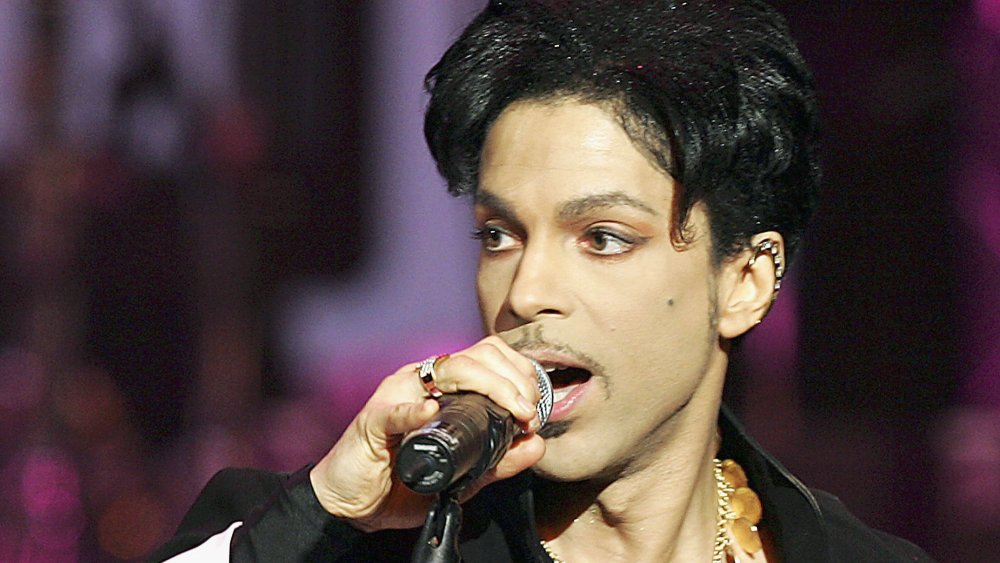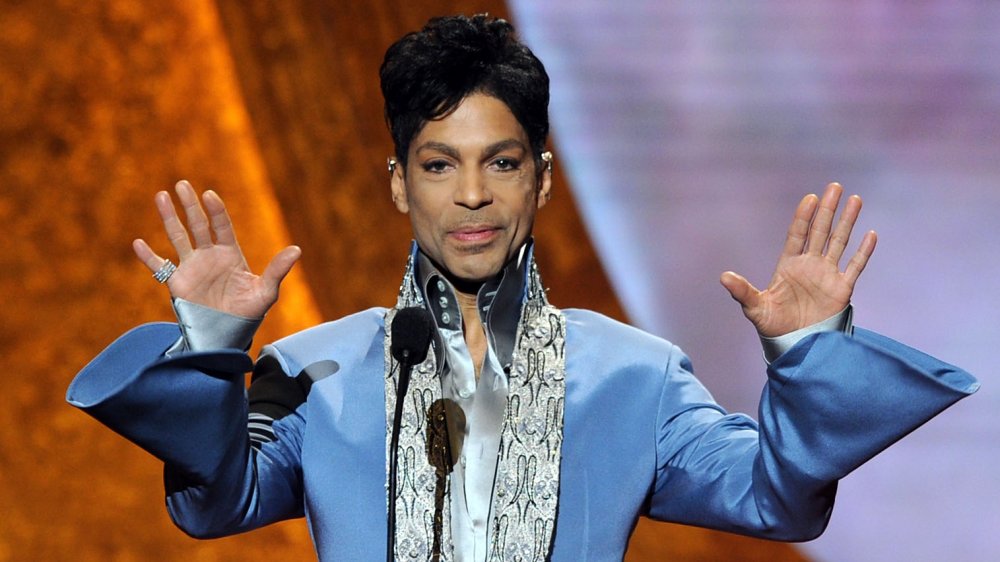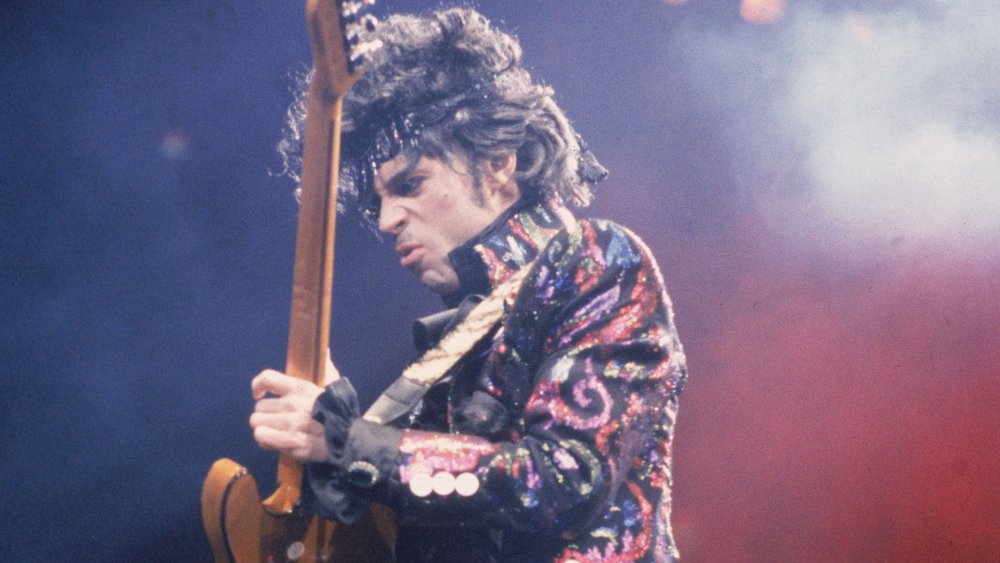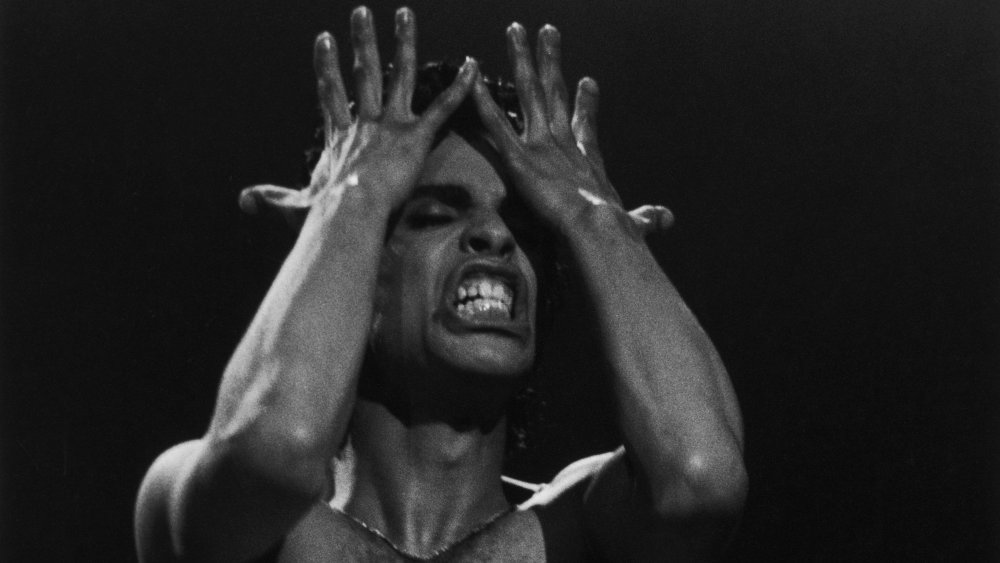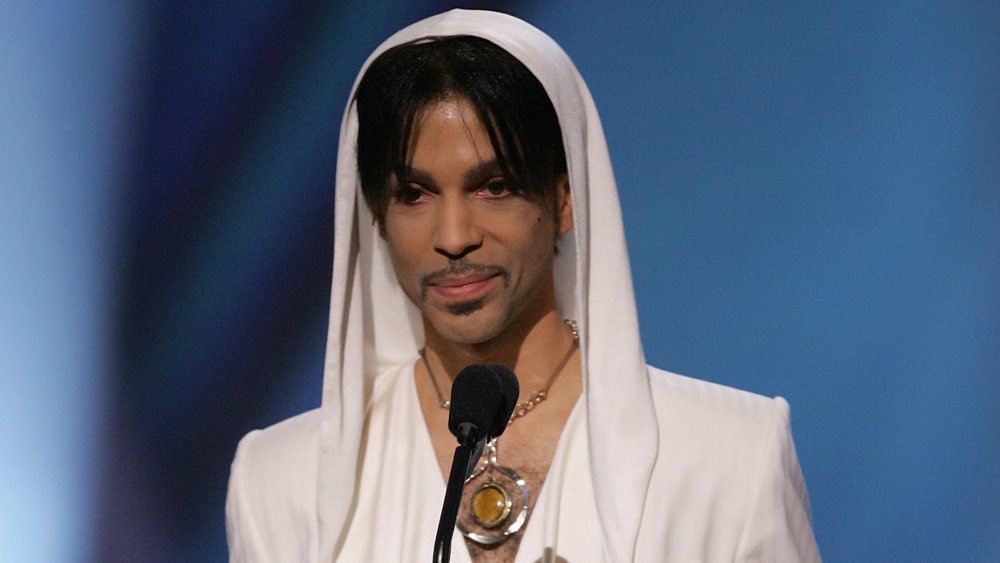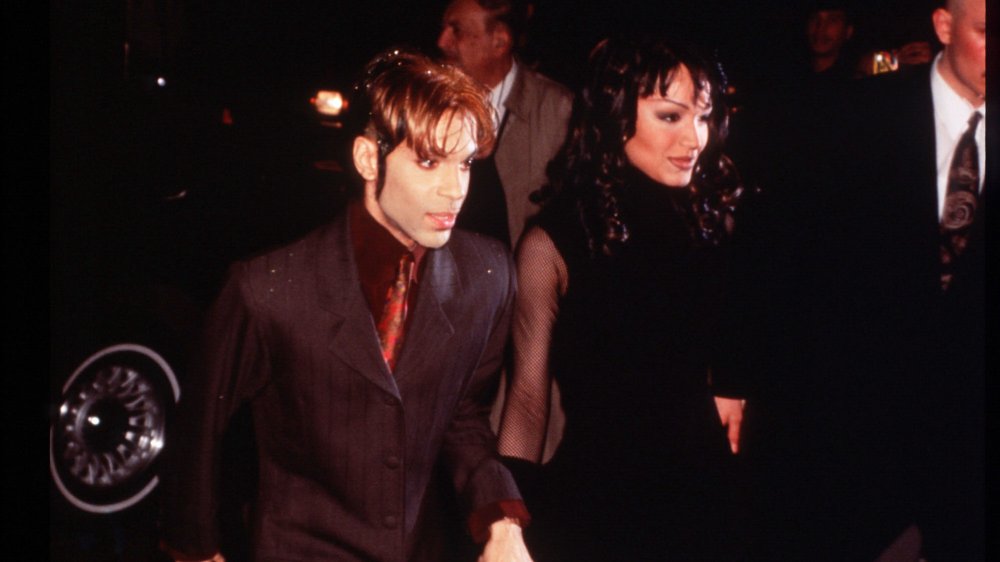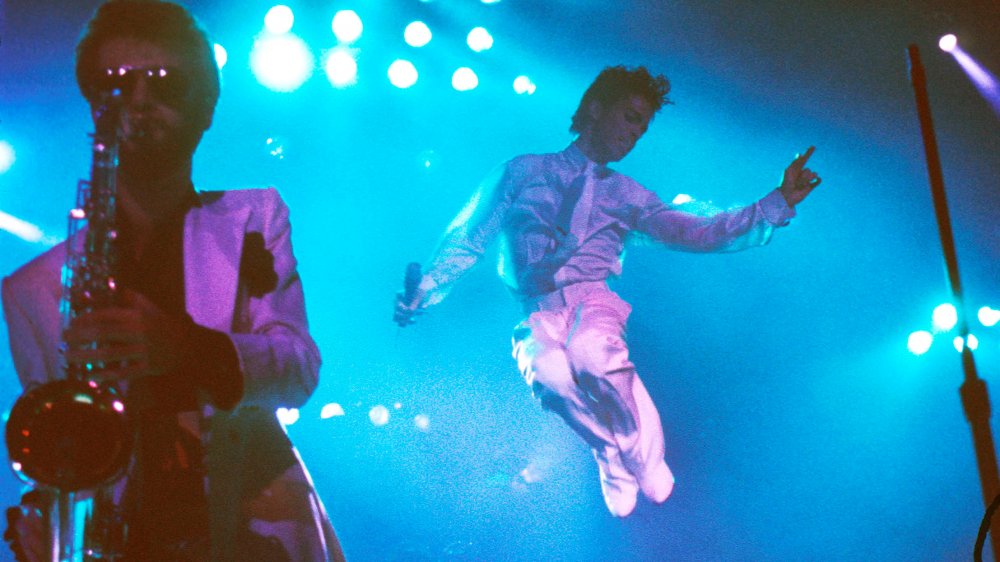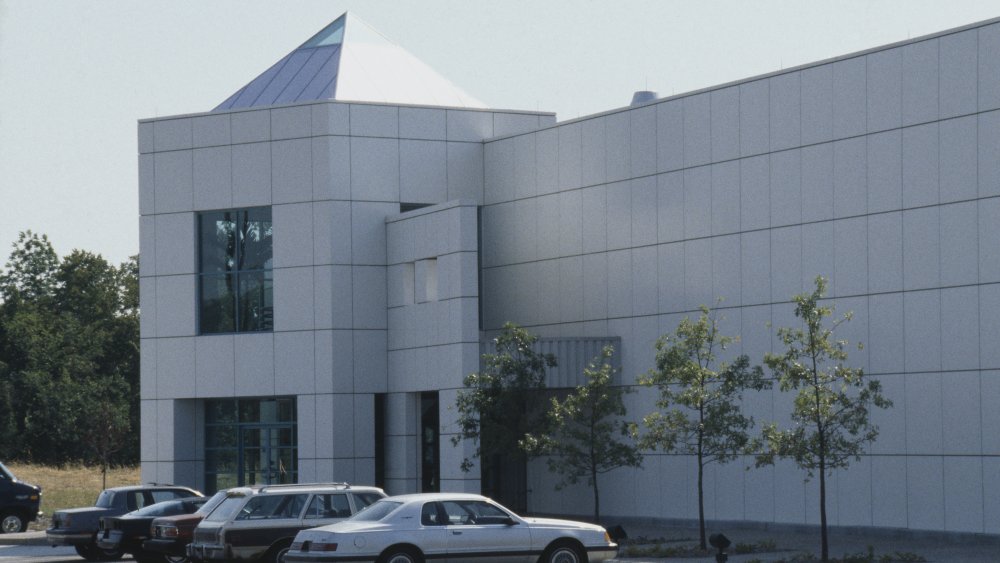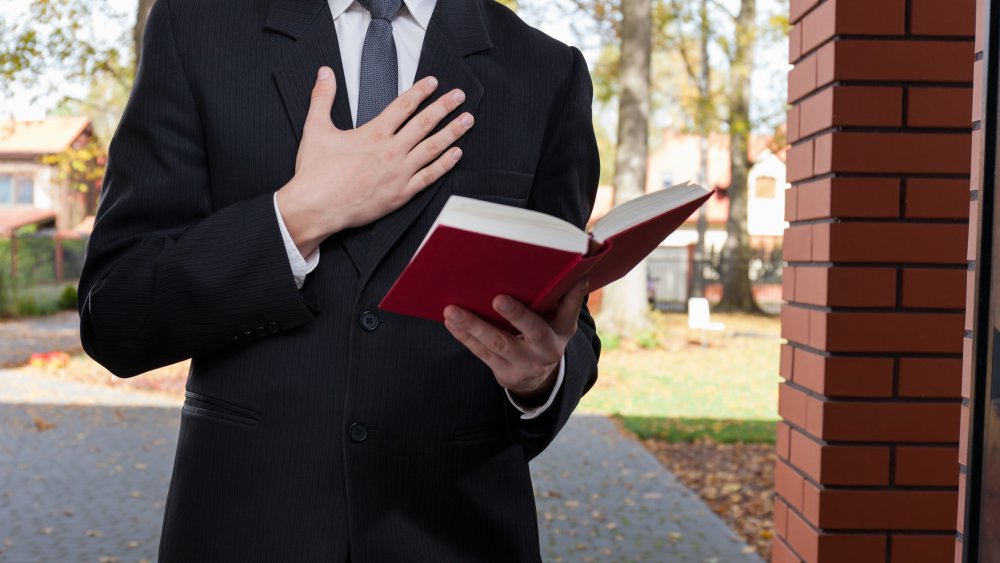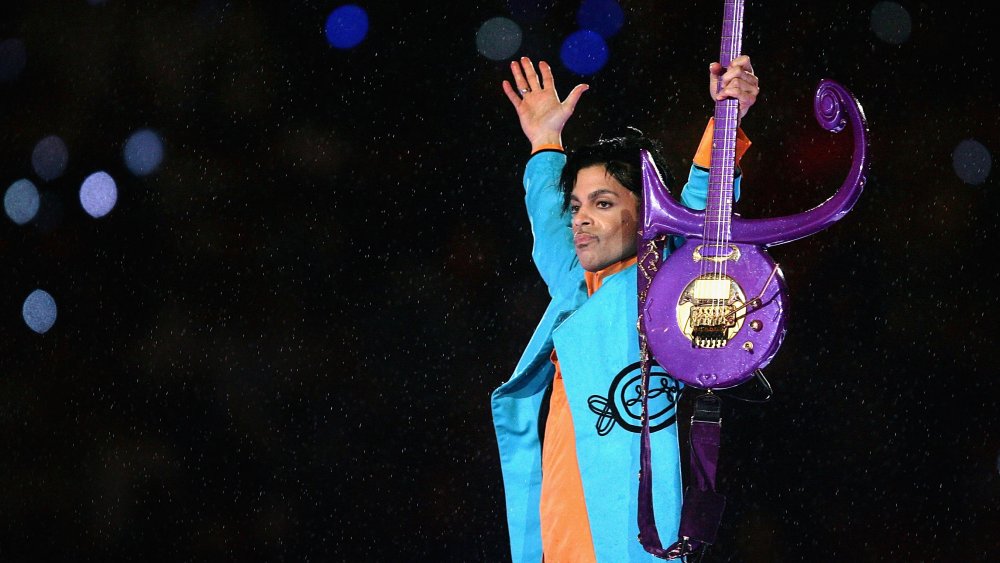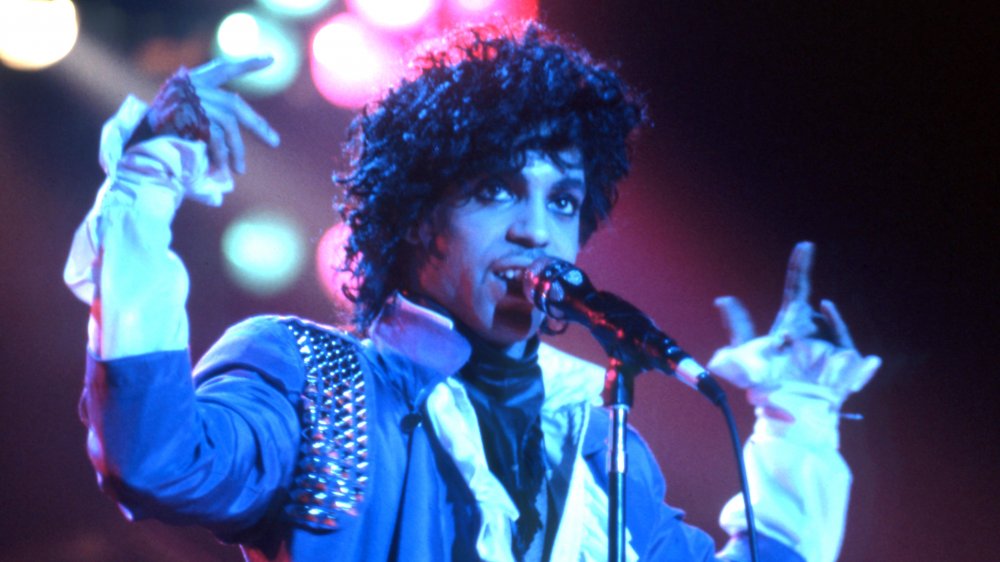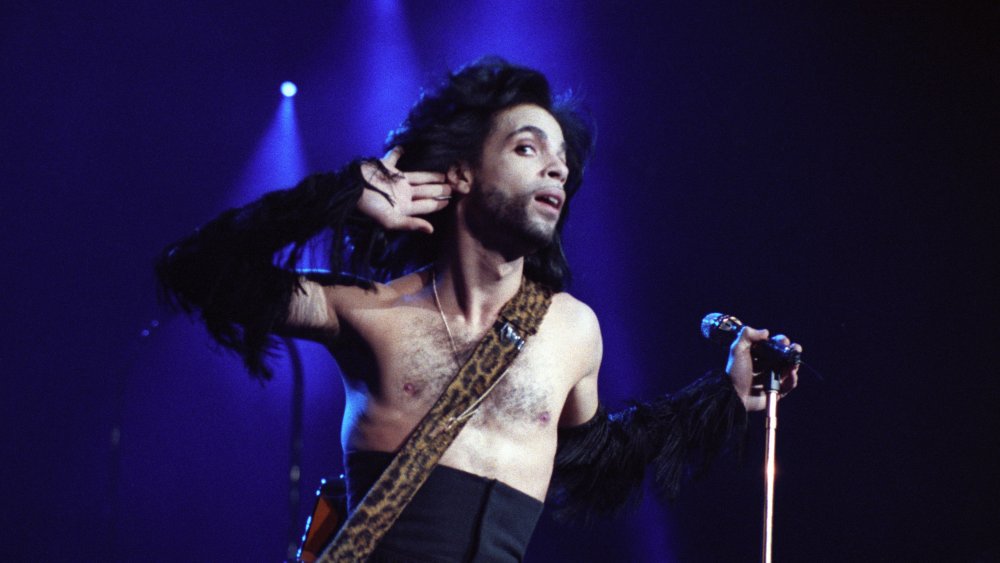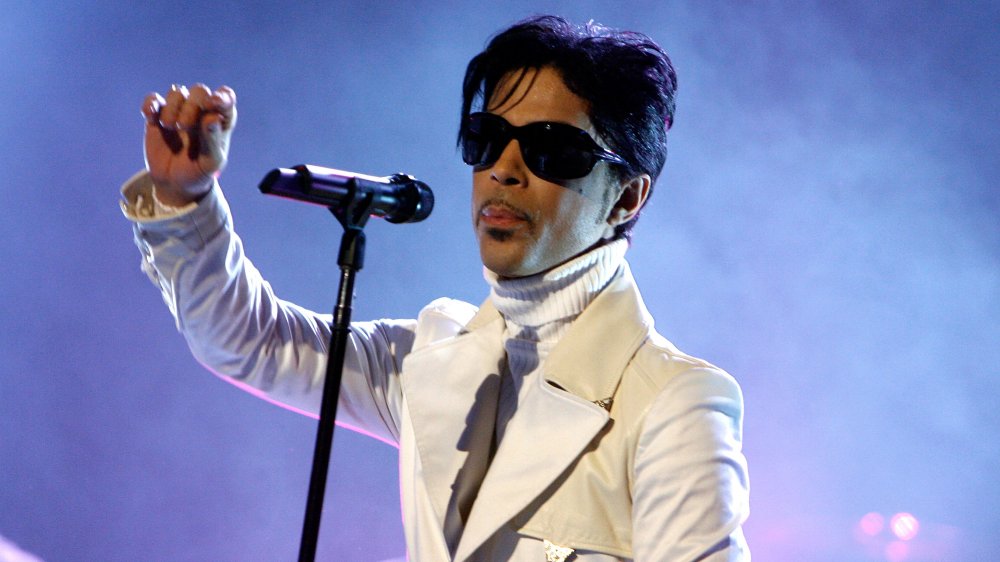Secrets Prince Didn't Want People To Know
To some, he was a symbol of defiance who rebelled against the music industry's control over artistic freedom, even changing his name to a glyph that no one — including his record label — could pronounce. To others, mainly younger generations, he was a mythical being recreated on Chappelle's Show who made great pancakes and could "shoot the J" in any pickup game of basketball. And to those who were fans of Prince during his rise to worldwide stardom in the '80s, he was The Kid from Purple Rain.
However, to everyone familiar with his work, Prince was the personification of music, an all-around artist who played most of the instruments on his albums. According to the BBC, it is said that Prince played 27 different instruments on his debut album For You. Along with his natural gifts came an unmatchable work ethic that allowed him to produce 39 studio albums, four live albums, countless compilations, and classic hit songs for numerous artists. By the time of his death, Prince had sold around 100 million albums and had written and recorded hundreds of unreleased songs.
Prince wasn't afraid to profess his love of music, but there were many parts of his life — both good and bad — that he would try to keep secret. Prince, being the mystery that he was, only ever revealed bits and pieces of his private life. However, after his death in 2016, associates, employees, friends, and family members have since revealed many more interesting details about his enigmatic life.
Prince locked away his prolific life's work in a secret vault
"Hubba, hubba, hubba! Money, money, money! Who do you trust?" is not a question only the Joker would ask — it's one Prince seemed to ask himself, too. After Prince died, the Carver County Sheriff's Office conducted an investigation that revealed photo evidence of a secret vault in the basement of his Paisley Park complex. Upon breaking into the vault, investigators found shelves loaded with hundreds of Prince's songs on tape, including his original (previously) unreleased version of "Nothing Compares 2 U," rare VHS recordings, Batman-inspired tunes, bars of gold, and a Minnesota Twins mascot costume.
In an interview with Rolling Stone in 2014, Prince mentioned his vault publicly, saying that he'd locked away songs "no one's ever heard" and that he "didn't always give the record companies the best song."
"Yeah, I like time capsule stuff," Prince said. "I have a couple Revolution albums in the vault and two Time albums, one Vanity 6 album ... and tons of stuff recorded in different periods. But so much gets recorded that you don't have time to compile everything. In the future you could put all the best stuff from one particular time period together and then you can release it."
Prince suffered from epilepsy
Those flashy outfits and dazzling color schemes the "Purple Rain" singer was known for weren't just a happy accident. Prince was born with epilepsy, a medical condition he struggled with as a child and which would later influence his music and fashion as an artist. "I've never spoken about this before, but I was born epileptic and I used to have seizures when I was young," he told PBS talk show host Tavis Smiley (via The Guardian). "And my mother and father didn't know what to do or how to handle it, but they did the best they could with what little they had."
Prince explained how his condition helped him create his vibrant brand as a performer. "From that point on, I've been having to deal with a lot of things, getting teased a lot in school," he said. "You know, early in my career I tried to compensate for that by being as flashy as I could and as noisy as I could." Prince even mentioned the impact it had on him in a song called "The Sacrifice of Victor," in which he describes a boy who was "Epileptic 'til the age of seven."
Prince hid a cocaine addiction from his ex for years
Prince was known by his bandmates to be a mean cook in the kitchen, and he publicly projected an image of living a clean lifestyle, but according to his ex-girlfriend Charlene Friend (via People), Prince would sometimes go for days without sleep, food, or water.
"He would sometimes stay up for five days at a time without sleep, food or even water, going nonstop back and forth to the studio," Friend said. "I had to sneak in catnaps to keep from passing out from exhaustion. The first time that happened, I asked him, 'How do you do this?'" Prince answered her with a smile, saying: "Angel food. Food of the spirit, not of the flesh."
It wasn't until Friend spoke with Prince's half-brother, Duane Nelson, that she found out the reason behind Prince's peculiar round-the-clock energy. Nelson explained to her that Prince's energy had nothing to do with "angel food." "We call it the cocaine diet," Friend claims Nelson said. "It was shocking to me to hear that," she said. "He hid it so carefully. I never saw him take even an aspirin. He seemed so health-conscious, always taking vitamins like echinacea and goldenseal."
Prince's secret gig as a philanthropist
One of the most surprising hidden treasures being uncovered by Prince's fans is the amount of charities and organizations which have come out to reveal how he sent them countless donations and support. Even more shocking, and admirable, is the fact that Prince never wanted anyone to know about it.
Prince worked with environmentalist and human rights activist Van Jones and supported his organizations, Green For All and #YesWeCode, to help kids succeed in lower-class areas. In an interview with Rolling Stone, Jones explained how their friendship began — which, of course, happened in the strangest way possible. After receiving a $50,000 donation with no name attached to it, Jones promptly returned it, but the money was sent back again. Later, Jones received mysterious a call from a representative for the donor, who stated, "I cannot tell you who the money is coming from, but his favorite color is purple." Jones immediately knew from the description that it was Prince, leading to their eventual friendship.
Prince wasn't shy when it came to sending large sums of money. He once donated $200,000 and turned an old nursing home in Minnesota into a charter school called Harvest Prep and Seed Academy and also gave to charities in Maryland, New York, Atlanta, and Seattle. He also donated to organizations such as PETA, Urban Farming, and the Jazz Foundation of America, among others. According to activist Toki Wright, when Prince gave, he had only one request: "Just don't say anything about it."
Prince tried to keep his son a secret
According to People, in the fall of 1996, Oprah Winfrey and her crew headed to Paisley Park to interview Prince and his then-wife, Mayte Garcia. Leading up to the interview, the international media had been abuzz with unconfirmed stories that Prince's son was either dead or suffering from a rare disease. "My husband took Oprah on a tour of Paisley Park, and her mission was clear," Garcia said. "She'd come to find out if the child was dead or deformed like people were saying."
The couple's son had passed away only days after being born, a tragedy both Prince and Garcia wanted undisclosed to the public. Prince did his best to create a distraction, which, ultimately, may have done more harm by causing even more speculation. When Oprah asked Prince about his son's condition, he replied: "It's all good. Never mind what you hear." The couple later suffered the loss of another child when Garcia had a miscarriage. Both losses created more tension on their marriage, leading to a divorce four years later.
Prince battled opioid addiction toward the end of his life
While some of those closest to Prince claimed to know of his opioid addiction, others who were just as close said they had no idea. Prince's longtime friend, bodyguard, and closest associate, Kirk Johnson, said he didn't know Prince was addicted to painkillers until a week before he died. Johnson told investigators that Prince was "looking just a little frail" but didn't connect it to an opioid addiction until the artist's overdose on his private jet. Johnson and those close to Prince reached out to an addiction specialist in hopes of helping the megastar.
According to The New York Times, Prince concealed his opioid addiction by "mixing various prescription pills in bottles for everyday products like Bayer and Aleve." His doctor also secretly obtained an opiate prescription for Prince by using the names of his staff. After Prince passed away, the investigators who searched Paisley Park took pictures of pills that were found in bottles throughout the complex. Most of those pills were in mislabeled containers, and many were counterfeit.
Prince was in talks to film a reality show for Netflix
Before his death, Prince had been speaking with Netflix executives about creating a reality show about Paisley Park, his recording studio and home. In an interview with GQ, Maya Washington, Prince's friend and photographer, spoke about a conversation she had with Prince about the possibility of following through with his show.
"He was supposed to do something with Netflix, a reality show on Paisley Park," Washington said. "He's, 'Why don't you help me?' I'm, 'I'd love to, but you'd have to be in it.' And he's, 'No, no, no, I'm not in it.' I'm, 'Why not? You're so funny — why don't you want anyone to see your sense of humor?' And he would shut it down: 'Maya, I can't be funny. I have to save the world.'"
The show would have been very interesting if it had focused on Paisley Park. In 1987, the 65,000-square-foot, $10 million complex was built in Chanhassen, Minnesota. Madonna, R.E.M., and Stevie Wonder were among the artists who recorded there before it turned into a private recording studio and served as Prince's home.
When Prince went door-to-door as a Jehovah's Witness
Prince was a known Jehovah's Witness, often spending time with his local congregation, but what many don't know is that he would sometimes go door-to-door proselytizing his neighbors, according to The Wrap.
In 2003, a Jewish couple in Eden Prarie, Minnesota, ended up inviting Prince into their home after he randomly showed up on their doorstep. Prince tried to convert them to Jehovah's Witnesses but was unsuccessful after speaking to them for 25 minutes. The wife, Rochelle, said, "You know what? You've walked into a Jewish household, and this is not something I'm interested in." Prince never gave up, though, leaving them a pamphlet before promptly leaving their home.
Another woman in St. Louis Park, Minnesota, said Prince showed up at her door and introduced himself as Brother Nelson. "Excuse me, but has anyone ever told you that you look a lot like Prince?" she asked. She fondly remembered Prince's reply: "It has been said."
Prince was treated for an overdose six days before he died
According to TMZ, almost a week before his death, Prince's private jet had to make an emergency landing in Moline, Illinois, only hours after he'd performed in Atlanta. Prince's reps first reported that he'd been experiencing flu symptoms, but as it later turned out, he'd been given a "save shot" in order to stay alive. In a Rolling Stone interview, Judith Hill, a singer and friend of Prince who was also aboard the plane, spoke about the frightening situation. When she and another passenger found Prince unresponsive, they contacted the pilot. "We knew it was only a matter of time; we had to get him down," Hill said. "We didn't have anything on the plane to help him."
After being given the life-saving shot of Narcan, doctors urged Prince to stay at the hospital for at least 24 hours so that the singer could receive proper medical care. Prince stayed defiant, explaining how he was a good judge of his body and that he'd only mixed two pills. However, when asked if he wouldn't take any more pills, Prince wouldn't agree. After only three hours, Prince left the hospital and finished his flight home.
Prince reportedly told Hill that he was depressed and wanted to sleep all of the time. After their last show, he said he thought he was going to fall asleep while performing. Only six days later, Prince would die of an accidental overdose of fentanyl, an opioid almost 50 times more powerful than heroin.
Prince secretly bought the house from the movie Purple Rain
The house from Prince's debut film Purple Rain is an iconic landmark and an astounding piece of history for fans of the artist's life and work. Over the years, many fans and collectors dreamed of purchasing it, and just eight months before Prince passed away, that dream became a possibility. Unfortunately, there was only one person who was going to secure ownership of the house, and it wasn't one of Prince's fans.
As reported by the Star Tribune, one day, a woman from NPG Music Publishing made an anonymous call to the home's selling agent, Deborah Larsen of Coldwell Banker Burnet in Minneapolis. The woman offered to buy the house right away — an offer Larsen found hard to believe. She decided to follow up with the woman by giving her instructions on how to finalize the deal. Hours later, the woman called back and finalized the deal with an offer of $117,000. Larsen later found out that the buyer was Prince.
Even though interior shots from the film were filmed at another location, the exterior of the home remains a part of film and music history, with the added value of Prince's purchase.
Prince had a swear jar in his recording studio
After becoming a Jehovah's Witness, Prince gave up lots of things in order to honor his faith, and one of those things was swearing. Prince put a swear box in his recording studio, and he and others around him would have to put money into it if they were caught using foul language.
"He didn't want to dishonor the faith," said James Lundstrom in an interview with People (via Yahoo!), a member of Prince's congregation. "He wasn't joking. You had to pay in cash in the bucket. He would charge you between three and 10 dollars per swear word." Lundstrom further elaborated, "In fact, one time I was carrying some luggage, and I bumped my knee [...] and I said, 'damn.' He said, 'What did you say?' I said, 'That's spelled d-a-m.' He was like, 'Brother Jim, Brother Jim.'"
Some of Prince's guests had no shame when it came to their cursing. At one point, Lundstrom recalled a visiting backing singer putting a "handful of hundred dollar bills in the swear jar as a down-payment for the rest of the day" before going on a profanity-laced tirade.
Prince went by the name Peter Bravestrong
Per the BBC, one of Prince's many pseudonyms was Peter Bravestrong, a name he used when traveling to protect his identity. Unsealed court documents and future interviews revealed the moniker. As it turns out, though, Prince went by many other names publicly, including Jamie Starr, Alexander Nevermind, and Joey Coco. Prince was also very secretive when it came to speaking on the phone, preferring to never use a cell phone after his own was hacked, and he would often try to disguise his voice.
Misty Copeland, one of Prince's dancers, told GQ, "He never called from a number you'd recognize, so you'd never know it was going to be him. Loved to speak in different accents — British and French ... everything. Sometimes I'd be, 'Who is this?' It would go on for a while, and then finally he'd laugh and it would be him."
